We think you’ll agree summer hasn’t quite felt like summer this year, but if you’re staying inside, that means you’re staying safe, and we’ve got you covered with plenty of Staff Picks to keep you entertained while you while away the hours:
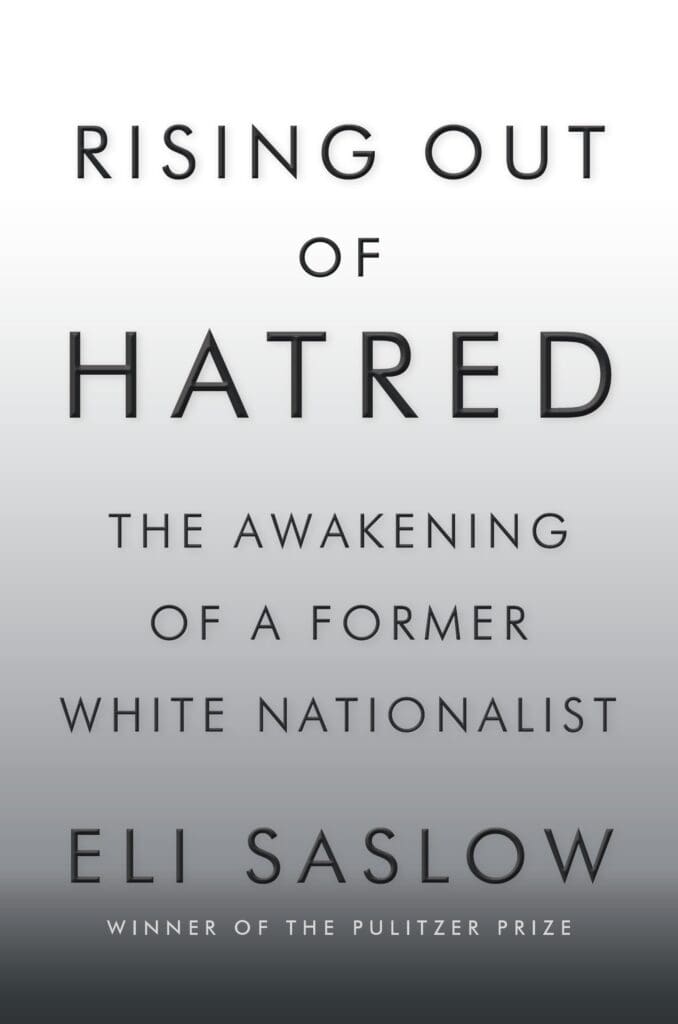
Jesse Bedayn, Intern: Derek Black was the godson of the David Duke, the former Grand Wizard of the KKK—at least, that’s where Eli Saslow’s utterly riveting book, Rising Out of Hatred, begins. The son of Don Black, founder of the largest white nationalist website, Stormfront.org, Derek was inculcated in white nationalism, becoming heir to the movement. After starting the children’s forum on Stormfront.org at age 10, he hosted a radio show that shed doubt on the Holocaust and peddled pseudoscience about race. Before he takes command, however, he ships off to the liberal bastion of New College of Florida, where he stumbles into a racial and ideological diversity that will upend his worldview.
Saslow, a Washington Post writer, found Derek years later after Derek had disavowed his former white nationalist beliefs and been disowned by his family. At first, Derek wasn’t interested in Saslow’s proposal for a book about himself—but then Trump was elected on a wave of xenophobia in 2016, and Saslow got a call from Derek. Now an anti-racist activist, Derek was ready to chronicle his rise out of hatred with Saslow.
The book starts just before Derek attends college, where he befriends a Jew and an immigrant before they, and the rest of the school, discover his white nationalist identity. Once the news breaks on the school’s online forums, there’s immense backlash from the student community. Surprisingly, his Jewish friend keeps inviting Derek to Shabbat dinners—hoping Derek can be extricated from his beliefs through exposure the very people Derek believes a threat to the white race. While Derek’s new girlfriend, who falls for him despite his views, argues with him day and night, sending him research and retorts to his arguments.
Saslow’s book, written with a sprinting pace, is an evocative and informative analysis of shedding racism. The narrative offers a roadmap for confronting bigotry, where there’s a place for both coaxing, exposure, and flat condemnation. Over the few years covered by the book, Derek is disentangled from white nationalism, finally writing a lengthy letter to the Southern Poverty Law Center—which included this passage:
“It has become clear to me that white nationalism is not a movement of positive identity or of asserting cultural values, but of constant antagonism at the betterment of other groups. . . . I can’t support a movement that tells me I can’t be a friend to whomever I wish or that other people’s races require me to think about them in a certain way or be suspicious at their advancements. Minorities must have the ability to rise to positions of power, and many supposed ‘race’ issues are in fact issues of structural oppression, poor educational prospects, and limited opportunity.”
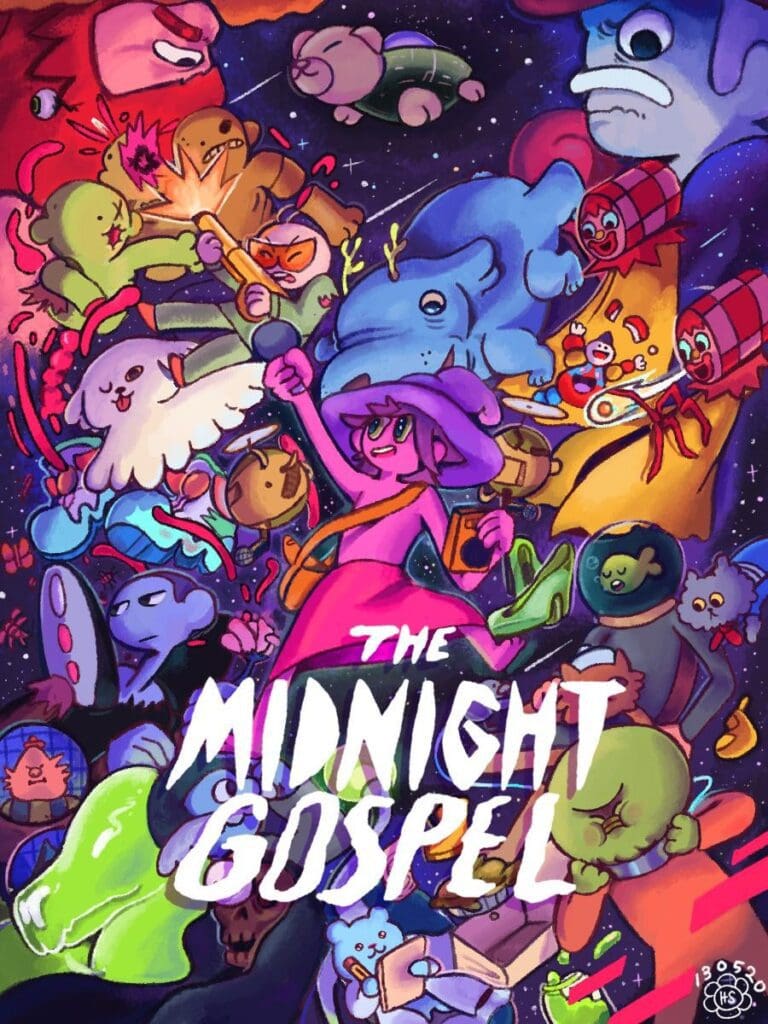
Bella Davis, Intern: When I started watching The Midnight Gospel, I was really just in search of a show to get lost in. The sitcoms I would normally turn to weren’t cutting it. Critics warned the show’s “strange brew won’t be for all tastes, but those willing to drink deep will find a wealth of vibrant visuals and illuminating insights,” which I found to be true as this existential, visually dazzling animated series quickly captivated me.
Released earlier this year, The Midnight Gospel follows a “spacecaster” named Clancy Gilroy who uses a simulator to travel to different planets and interview the inhabitants. The interviews are derived from actual interviews and audio from the podcast Duncan Trussell Family Hour, in which Trussell, a comedian, talks with guests about spirituality, existence, drugs, and death. Among the characters Clancy—voiced by Trussell—encounters in the eight-episode series are a president of a country overrun by zombies, a knight on a mission to avenge her lover’s murder, and a prisoner who dies over and over again in trying to escape confinement.
The 36-minute-long final episode—using audio from a 2013 interview with Trussell and his late mother Deneen Fendig, recorded weeks before she died of cancer—begins with Clancy preparing to journey to another planet when his mother suddenly shows up. Clancy reverts to an infant and the two begin to age. When his mother dies, Clancy becomes pregnant and gives birth to an infant Deneen who continues their conversation where they left off. The two are transformed into celestial bodies, his mother a planet and Clancy an orbiting moon. As they’re pulled towards a black hole, Clancy says, “Well, I love you very much, obviously.” His mother replies, “I love you, too. And Duncan, that kind of love isn’t going anywhere. And that’s another thing you find—that I may leave this plane of existence, sooner rather than later, but the love isn’t going anywhere. I’m as certain of that as I am of anything.”
The tender yet frank way in which death, loss, and the fleeting nature of human connection are discussed in The Midnight Gospel—throughout the series but especially in the finale—is special and makes those heavy subjects that many of us tend to avoid feel more approachable.
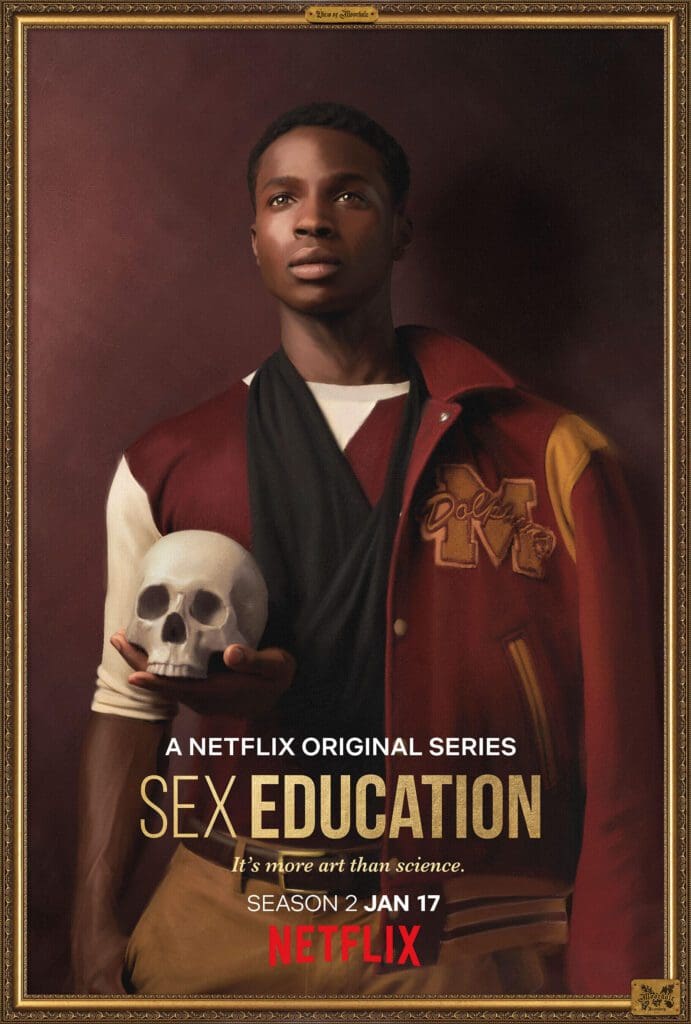
Cade Johnson, Intern: Season two of Netflix series Sex Education is the hopeful piece of quarantine viewing that too many people have missed. I watched the first season a little more than a year ago and binged the second season in just a couple days this past May, and have since revisited a few episodes. The focus of the show is Otis, a high school student who lives in the United Kingdom with his mom, a sex and relationships therapist. Otis develops a business scheme with his friend and romantic interest, Maeve, providing sex and relationships advice to his peers on subjects that public schools often address inadequately in sex education programs, such as queerness, consent and abortion. Otis has acquired all of this knowledge secondhand from his mother.
As the show progresses into the second season, the centralization of the story around Otis diffuses and makes way for a story that is more interested in its richly characterized and well-acted ensemble cast. The series is delightfully funny and touching, and perhaps one of the ways the show shines is through its characters’ moments of self-interrogation and self-discovery, and its emphasis on the importance of sharing experiences to connect and grow. I say that the show is “hopeful” because knowing this kind of content is available to the younger generation is heartening. It feels corrective to society’s haphazard approach to sex education and rampant misconceptions about sexuality without feeling didactic or professorial, which is particularly important to me, having grown up gay in the late 2000’s without many resources about sexuality beyond the internet. I recommend this show to anyone looking for a bright, comforting television show that asks important questions and delivers a lot of laughs.
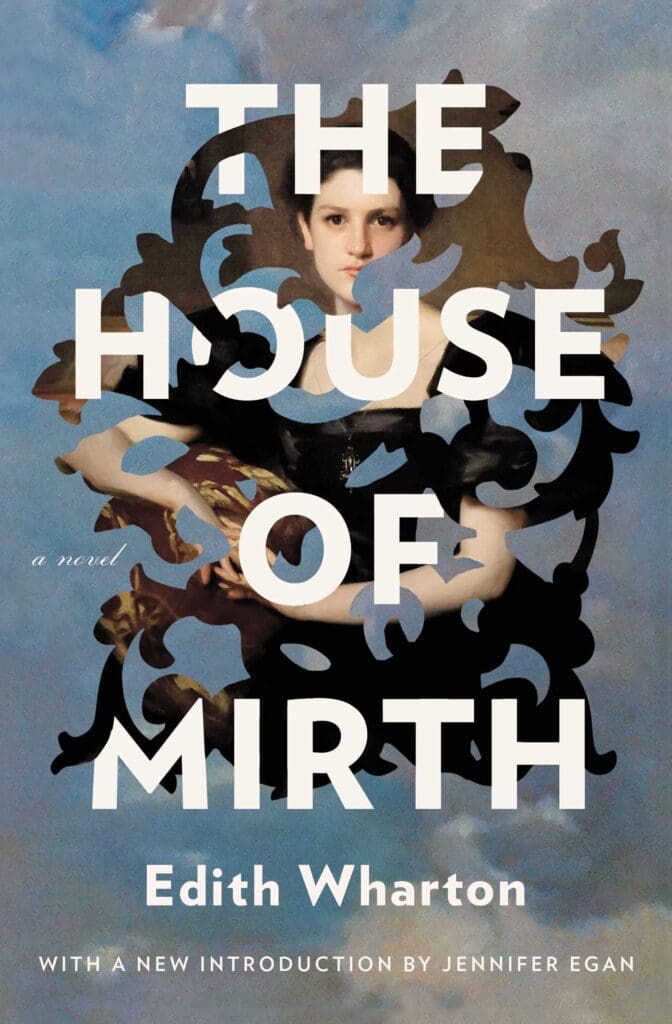
Zack Ravas, Editorial Assistant: Under normal circumstances, the month of July conjures memories of barbecues, fireworks, and blockbuster movies at the multiplex; most of those things are out the window this year, but perhaps it makes a kind of sense that the most compelling media experience I had this month was a “blockbuster” of its era: Edith Wharton’s 1905 novel, The House of Mirth, which was a runaway success when first serialized in Scribner’s Magazine and solidified Wharton’s position as a literary superstar in America.
The position of her protagonist, Lily Bart, is much more tenuous. 29 years-old, beautiful but unmarried, Bart moves through the upper crust world of turn of the century New York while forced to contend with financial resources much more limited than her wedded and well-to-do friends, as well as the whispers of aspersion that grow increasingly loud the longer Lily avoids the clanging of wedding bells. And why does Miss Bart remain unattached to any number of the wealthy suitors who might court her, even as her friends and relations hound her to finally tie the knot? Well, the ambiguity surrounding Lily’s indecision is one of the great pleasures of the novel; if we are being generous towards Miss Bart, as I am inclined to be, we might suggest some core integrity of her character, some inner truth, prevents her from making the easy decision to enter the more comfortable lifestyle offered by the high-earning but dreadfully dull men in her orbit, because she knows it will undoubtedly lead to compromise and her essential unhappiness—even as she desperately desires a free, easy life in the lap of luxury (and don’t we all?).
Even though The House of Mirth was written over a hundred years ago, there is something about Lily’s circumstance and anxiety that reads as terribly familiar and, well, millennial (and so we wonder how much has really changed, a century later). Wharton’s prose is masterful, with all the deft wit and sardonic humor of, say, Oscar Wilde’s drawing room comedies, yet bolstered by a sensitivity towards Lily’s vulnerable standing in society, and how this sets the stage for inevitable tragedy. All the same, her narrative voice possesses what fellow admirer Bret Easton Ellis calls Wharton’s “God’s eye neutrality,” a stance that also allows Wharton to poke (gentle) fun at Lily whenever her sometimes over-the-top hysterics call for it. Still, we feel for our protagonist—and feel deeply—as her story underscores how so much of what secures our position in American life is driven by forces, be they love, capital, or subtly perceived sleights, that are beyond our control.
My edition of The House of Mirth features an introduction by Jennifer Egan, who briefly touches on Wharton’s anti-Semitic passages. These passages are a real blemish on the novel; though there is value in realizing just how ingrained such beliefs have been in American culture, and not that long ago at that. While she was not immune to the prejudices of her day, Wharton did manage to extend a nuanced level of characterization towards each member of her cast; when I think back on Mirth, I will remember Lily Bart, and the irreconcilable unhappiness at finding your desires have outpaced your means.
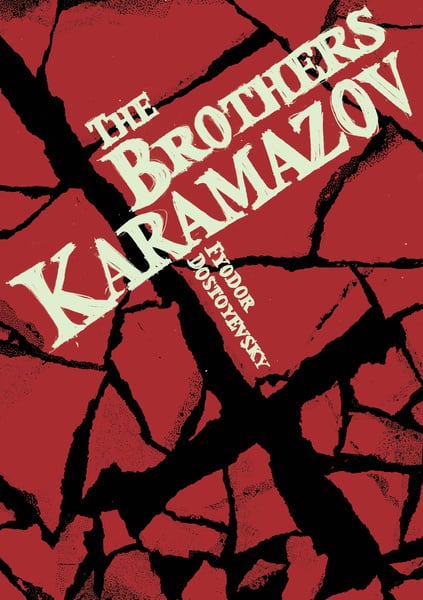
Laura Cogan, Editor: The demands of this moment are many and urgent.
The pandemic upends nearly every aspect of daily life, and brings the anxiety and dread of mortality (our own, our loved ones’) inescapably into our most mundane decisions. The fragility of our endeavors greets us somberly each morning, and hovers as we reach for sleep each night.
We do our best with our days, creating what modest beauty we can, where we can, while the country around us continues its rampant dysfunction. Those of us in any position of privilege are called to face ingrained, systemic injustice, take inventory of our own culpability, and make concerted efforts toward correcting so much wrong. We seek actionable steps, while acknowledging that what we’re dealing with is systemic, elaborately woven into the fabric of every major institution, and therefore not at all simple to root out.
Time collapses on itself. Half the year has already slipped away in a restless repetition (with minor variation) of the same day we’ve been living since mid-March.
It is an impossible moment. We are called to slow down, and to hurry the hell up. To wait, be present in this moment, and to wake up from the complacent spell of waiting. We know tomorrow is not promised. So how best to live, this day?
Amid all this, for anyone fortunate enough to still have steady employment and the ability to work from home, there seem to be two schools of thought regarding taking on personal goals: one, to be easy on ourselves, and not take on more while we are already so beleaguered. Let go of timelines and To-Do lists, relinquish the ideal of productivity, remember you are a person first, not a worker, not a self-improvement project. The second, to somehow create an opportunity out of disrupted schedules, vanished norms, an unprecedented amount of time at home. Make bread (sourdough, banana), meditate, deep clean the oven, train for a 5K, learn to dance, somehow.
I find myself vacillating between these perspectives from one day or even one hour to the next. But in my reading life I’ve found greatest solace and inspiration from going deep: I finally made time to read The Brothers Karamazov. I hardly think this is the time for advice, offering it or soliciting it. We are all just doing the best we can. No one knows what we or anyone else should do, how we should endure these days or optimize them. I don’t know what anyone should read, bake, eat, watch, or do to cope. I don’t know whether we should try cutting our own hair. But if you are lucky enough to have this on your list of classics you’ve not yet read (and have been hoping no one will ask you about), I offer this personal observation about reading it this summer: Dostoevsky makes a fine quarantine companion.
Who dwells more deeply on moral and spiritual anguish, or the ripple effects of our decisions? Who better captures the claustrophobia of a loaded, precipitous moment, a small set of rooms, a series of fraught days? Where better to find a meditation on what we owe one another, on guilt and innocence, and how, though we might long for clarity and easy judgment, we usually find that we and our fellow humans are both innocent and guilty at the same time? What better to read while taking inventory of our selves, while coping with loss, while seeking how to be?
Nothing will be resolved here, in this book or in this tense summer of 2020. But in life as in literature, resolution and synthesis may not be our highest aspiration. Instead, the seeking, here, is to spend time with the important questions, and deepen our understanding of the questions themselves.
To a packed, hushed courtroom, Fetyukovich declares, “We are not long on this earth, we do many evil deeds and say many evil words. And therefore let us all seize the favorable moment of our being together in order to say a good word to each other as well. And so I do: while I am in this place, I make the best of my moment.”
Spending time with this book was, for me, one way to make the best of this moment, this strange summer.
